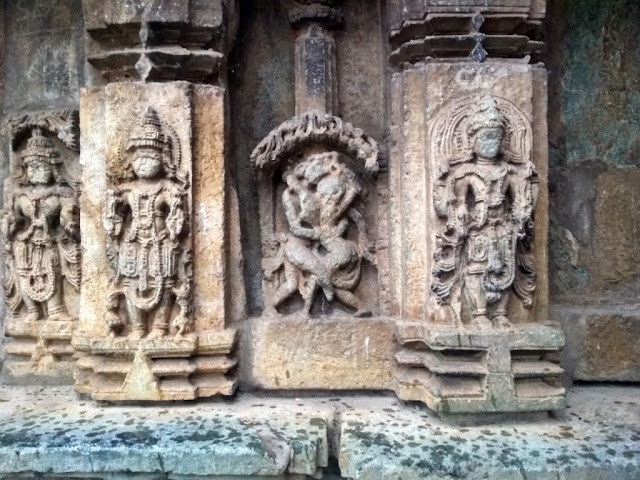Lakshmi Narasimha Temple,
Bhadravati – The Temple
The temple is facing towards east and stands on a raised platform (jagati). The platform provides ample space for the devotess to circumbulate the temple. The platform appears to rest on the back of ashtadikgajas (eight elephants). The temple is constructed on an 8-pointed star plan, with bifacial square plan symmetrically rotated. The temple is constructed in trikutachala style, consisting of three shrines, one each on north, south and west.
The western shrine houses Lakshmi Narasimha, northern shrine houses Purushotama and southern shrine houses Venugopala. The central shrine (western shrine) is the most prominent one. The shrines are square on plan. All the shrines connects to the closed navaranga via antrala. The ceiling of the navaranga is supported by lathe turned pillars. These lathe turned pillars with four brackets is an excellent example of amalgamation of Chalukya and Hoysala architectural style.
The navaranga opens to the courtyard through an open pillared mukha mandapa. The mukha mandapa is supported by lathe turned half pillars and parapets on either side. Dwaja Sthamba and Garuda Sthamba can be found in front of the mukha mandapa. All the shrines are crowned with vesara style shikara. The original shikaras were ruined and have been restored with a conical structure. The antrala also has a tower called sukanasi which looks like a low protrusion of the main tower over the shrine.
The outer wall of the antrala is decorative but inconspicuous because it appears like a short continuation of the shrine outer wall. The eaves runs around the sanctum where the superstructure meets the wall of the shrine. The eaves projects about half a meter from the wall. Miniature decorative towers can be seen below this eaves. Second eves can be seen below this decorative towers.
Friezes of Hindu deities and their attendants can be seen below the second eaves. There are several intricately carved sculptures namely Ganesha, Chandika, Bhairava, Harihara, Dakshinamurti, Nataraja, Durga in dancing form, Mahisasuramardini, Rati & Kamadeva, Saraswathi, Brahma, Surya, various other Hindu deities, apsaras, musicians and dancers. The most notable image is the image of Surya signed by the architect, Maba.
.jpg)



.jpg)

.jpg)
.jpg)

.jpg)
No comments:
Post a Comment